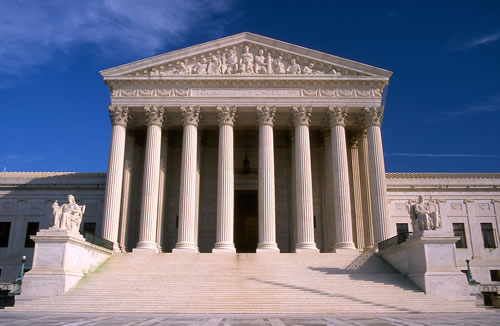

Share
When it comes to the issue of union fees and free riders heading towards the U.S. Supreme Court, it’s a case of “here we go again.” But with a difference.
Early this year, the court tied 4-4 on the Friedrichs case, where dissident California teachers, backed and funded by the anti-worker anti-union National Right to Work Committee, argued that state laws requiring them to pay “agency fees” — not union dues — for bargaining and contract enforcement infringed on their rights of free speech.
Now a virtually identical case, Janus v Illinois, is headed towards the justices from the Land of Lincoln, as state worker Mark Janus argues that requiring him to pay the agency fees violates his free speech, too. The justices will take the case, but haven’t decided when.
The difference, of course, is the ninth justice on the High Court, conservative Republican Neil Gorsuch, whose appellate court rulings and dissents showed unremitting hostility to workers. When the justices take the Janus case, it’s a good bet he’ll be the fifth vote the court’s Republican-appointed bloc need to toss out the agency fees.
And that will accomplish a key goal of the radical right and their business allies: Depriving public worker unions of funds they need to defend workers, as both “free riders” and members stop paying. And lower cash means unions and workers will be weaker in opposing business and right wing schemes.
The argument date on Janus hasn’t been set yet, but both sides are already weighing in. In an indication of its nature, a friend-of-the-court brief, asking the justices to rule on Janus’ case, was filed by Karen Friedrichs, the dissident Teacher whom the right-to-work crowd recruited to lead the prior case against the agency fees. A right-wing legal foundation in Washington state is representing her, this time.
The Janus case is also not the sole case the justices will hear that affects workers and their allies. The second-most important one involves workers challenging mandatory arbitration at Murphy Oil in Alabama, plus two other enterprises, all rolled into one High Court hearing.
In the Murphy Oil case, the Supreme Court will wade into the thorny issue of whether mandatory arbitration clauses override the National Labor Relations Act, which gives workers the right to join together to act collectively to protect and better themselves. The workers can join together for collective action in class action suits, except when the arbitration clauses bar it. In Murphy Oil and the two related cases, workers want to sue as a class because their employers broke the Fair Labor Standards Act, the original minimum wage and overtime pay law.
The High Court isn’t the only decider in such arbitration-vs-workers rights struggles. The National Labor Relations Board has been tossing out such mandatory arbitration clauses left and right for the last several years. And the federal Consumer Financial Protection Bureau recently promulgated new rules against letting mandatory arbitration override class action claims against financial institutions. CFPB chief Richard Cordray bluntly said such mandatory arbitration favors the institutions – the banks — 93 percent of the time.
The Murphy Oil case also shows another impact of the 2016 GOP presidential election win on the High Court. The Democratic Obama administration sided with the workers and the NLRB and filed a brief asking the justices to uphold labor law, not mandatory arbitration. The GOP Trump administration’s Justice Department reversed course and came down against workers and labor law and for mandatory arbitration.
“The Federal Arbitration Act’s strong presumption in favor of enforcing arbitration agreements may yield where Congress itself has explicitly overridden the FAA,” Trump’s Justice Department explained. But that’s the only way the FAA can yield, it added. “Although the Fair Labor Standards Act authorizes employees to pursue collective actions in court, that is not meaningfully different from…other laws this (Supreme) court has found insufficient to override the FAA’s mandate” for forced arbitration.
This article was updated on 8.23.19

